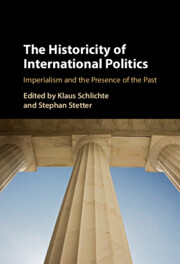Book contents
- The Historicity of International Politics
- The Historicity of International Politics
- Copyright page
- Contents
- Figures
- Contributors
- Acknowledgements
- Introduction
- Part I The Imperial Past and Present in International Politics and IR
- Part II Historical Sociology and the Imperial Fundaments of International Politics
- 8 The Afterlives of Empires
- 9 Divided World
- 10 The Colonial Origins of Policing
- Part III Global History and the Imperial Fundaments of International Politics
- Conclusion
- Index
- References
9 - Divided World
Encountering Frantz Fanon in Kabul
from Part II - Historical Sociology and the Imperial Fundaments of International Politics
Published online by Cambridge University Press: 29 June 2023
- The Historicity of International Politics
- The Historicity of International Politics
- Copyright page
- Contents
- Figures
- Contributors
- Acknowledgements
- Introduction
- Part I The Imperial Past and Present in International Politics and IR
- Part II Historical Sociology and the Imperial Fundaments of International Politics
- 8 The Afterlives of Empires
- 9 Divided World
- 10 The Colonial Origins of Policing
- Part III Global History and the Imperial Fundaments of International Politics
- Conclusion
- Index
- References
Summary
In his seminal work, The Wretched of the Earth (1961), Frantz Fanon develops a micro-sociology of colonial society. He characterizes the latter as a world divided in two, one for the colonizers and one for the colonized. In many former colonies such enforced racial or ethnic segregation has become a thing of the past. Yet, the socio-spatial arrangements described by Fanon re-emerge in contemporary zones of conflict, where they are recreated as security measures intended to separate the protagonists of international peace and development from the threats posed by contentious local populations. Based on ethnographic field research in Kabul in 2015, this contribution analytically pursues these structural resemblances. The aim, however, is not to make a (cheap) argument about the neo-colonial character of global humanitarianism, but to investigate the significance of this particular presence of the past for a sociology of world society.
- Type
- Chapter
- Information
- The Historicity of International PoliticsImperialism and the Presence of the Past, pp. 191 - 207Publisher: Cambridge University PressPrint publication year: 2023



